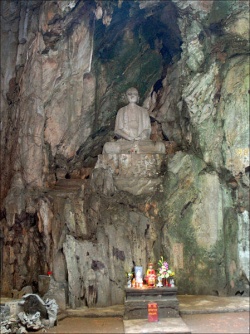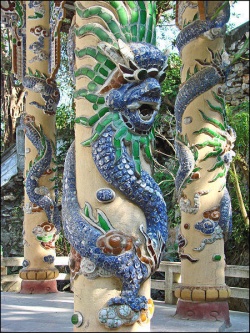Marble Mountains (Vietnam)
Marble Mountains (Vietnamese: Ngũ Hành Sơn; "Five elements mountains") is a cluster of five marble and limestone hills located in Ngu Hanh Son ward, south of Da Nang city in Vietnam.
The five 'mountains' are named after the five elements; Kim (metal), Thuy (water), Moc (wood), Hoa (fire) and Tho (earth).
All of the mountains have cave entrances and numerous tunnels, and it is possible to climb to the summit of one of the peaks.
Several buddhist sanctuaries can also be found within the mountains, making this a famous tourist destination.
The area is famous for stone sculpture making and stone-cutting crafts.
Direct rock extraction from the mountains was banned recently. Materials are now being transported from quarries in Quang Nam province.
As of 2003 the district had a population of 50,105 . The district covers an area of 37 km². The district capital lies at Da Nang.
Vietnam war
The mountains were very near the American Marble Mountain Air Facility during the Vietnam War.
According to William Broyles, Jr.'s "Brothers in Arms", the Marble Mountains contained a hospital for the Vietcong, probably within earshot of the American air field and China Beach (which bordered the air field on the side opposite the mountains).
He describes the enemy as having been so "certain of our ignorance. . . . that he had hidden his hospital in plain sight".
Buddhist and Hindu grottoes
The Marble Mountains are home to several Buddhist and Hindu grottoes.
A stairway of 156 steps leads to the summit of Thuy Son, the only marble mountain accessible to visitors.
It allows a wide panoramic view of the surrounding area and the other marble mountains.
There are a number of grottoes, including Huyen Khong and Tang Chon, and many Hindu and Buddhist sanctuaries, the pagoda Tam Thai, built in 1825, Tu Tam and Linh Ung, and the tower of Pho Dong.
The sanctuaries feature statuary and relief depictions of religious scenes carved out of the marble.

